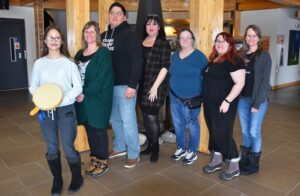Efforts to rename Squaw Lake Road empowers students

By Kelly Anne Smith
NIPISSING FIRST NATION — Students of the Anishinabek Educational Institute (AEI) have been working to persuade the Township of McKellar, just east of Parry Sound, to change the name of Squaw Lake Road.
Native Identity Development students at AEI had trouble believing their instructor that there was a Squaw Lake Road in Ontario.
Squaw Lake Road runs alongside Moffat Lake. Years ago, the lake’s name was changed from Squaw Lake to Moffat Lake.
The students requested that McKellar consider Nibi Kwe Lane as the new name which is translated as women of the water. In the letter to the council, Natasha Ward writes on behalf of the class.
“The reason for the request is our class is looking to create change to honour First Nation communities and restore Native identity throughout Ontario.”
Instructor Joanne Morrison teaches the course as part of AEI’s Native Community Worker Program.
Her family has a negative history with the word squaw as Joanne’s mother had experiences with the term used in the derogatory.
According to the Merriam-Webster dictionary, the word squaw has evolved from its original disparaging usage, to now usually in an offensive or derogatory manner. Squaw is defined as: squaw\ˈskwȯ\ – noun 1. now usually offensive: an American Indian woman; 2. dated, usually disparaging: woman, wife.
After learning the offensive name of the road existed, Joanne Morrison gave the class the option of making positive change by helping to have the name replaced as a group project.
“I remembered when my boyfriend was working in the Parry Sound District area and he wanted me to come and visit with him. I asked him to give me the address to put in my GPS. He said it was on Squaw Lake Road. When he said this my heart immediately dropped and my tummy felt sick from the memories of how this word made my mother feel when she was growing up,” she recalled. “My mother told me this is the one word she hated as she had been called this name many times as a child and as a young woman as a way of putting her down for being an Indigenous woman. This word caused her to feel shame of who she was and the colour of her skin. Knowing how this word made my mother feel, the term would also cause me pain when I would hear it.”
Students Ashley Morrison – Nichiiwtoo Kwe; Carrie Ward – Giizhigaate Kwe; Nathan McMartin – Muskwa Animiki Binishi Anini; Jane Vester – Nigik Sibi; Lacey Axel Jones – Zibikew; and Natasha Ward – Naw-huhshkahns were enthusiastic to take on the challenge of the name change. The students also asked to include Monica McWhirler who started with the class but moved on to full-time employment.
Ashley Morrison – Nichiiwtoo Kwe says squaw has a misogynistic meaning used in western society by non-Indigenous people to oppress Indigenous females. She says women and girls are sacred and should be heavily respected.
“The word squaw is a Mohawk word that describes the female genitalia. The original form and translation were in no way intended for derogatory use. It’s been misused with the intention to degrade Indigenous women and girls,” explained Morrison. “As an Ojibwe woman, I believe that Indigenous people must stand in solidarity together to protect our traditional languages and the values in which those languages have been built upon. In a patriarchal and colonial society where our histories have always been written for us by others, we are grateful to have the opportunity to join the Indigenous people that bravely tell their own stories.”
Student Lacey/Axel Jones – Zibikew says water is a big part of the lives of Indigenous people and deserves respect.
“Water crosses over in all plans. For me being Two-Spirited, hearing that word used is more of an insult to my female half of my self.”
Natasha Ward adds, “Water teaches us to rise to the occasion when needed. It teaches us when to be still and when we need to wait or reflect.”
Letters were sent to the residences on Squaw Lake Road for their input for changing the name.
McKellar’s Clerk Administrator, Tammy Wylie, wrote in an e-mail that 19 responses were received after writing to 25 Squaw Lake Road homeowners about the name change request.
“18 voted ‘No’ to the proposed name change, but five would like to see the road name changed to either Swan Lake Road or Moffat Lake Road. One voted ‘Yes’.”
All municipalities should revisit the meaning and history of their place names, suggests Natasha Ward.
Jane Vester – Nigik Sibi talked of more work needing to be done with a Squaw Lake in the unorganized district of South Nipissing and a lac de la Squaw in Quebec. There is also Squaw’s Tit in Alberta.
“We strongly feel that name changes are a good step in the right direction in promoting equality and education,” opines student Carrie Ward.
Instructor Joanne Morrison says the course is about understanding our history, connecting and having pride in our Indigenous identity.
“Why not take this opportunity to show how we can be empowered as Indigenous people and make change and not accept these derogatory terms still used to this day. I can’t express how proud I am of my class to take on this project and make change. Watching them feel the pride in what they were doing was such an honour. No matter what the results, they have learned that they can empower themselves to create change.”

